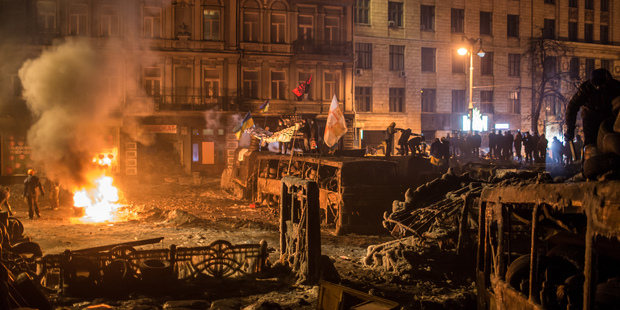A Disordered Ukraine
"Ukraine is showing Belarus an example of how one should fight for freedom. I am sure that our countries have a common future in Europe, where neither Ukrainians nor Belarusians will die."
Vladimir Neklyaev, Belarusian opposition leader

On the other hand, after ignoring appeals from the opposition for Ukrainian President Viktor Yanukovych to meet with the opposition to hear their grievances and offer concessions, the strength of the protests and the velocity of their growth outside Kiev has finally compelled him to make promises, even to offering to make Arseniy Yatsenyuk the country's prime minister. To which Mr. Yatsenyuk responded that Yanukovych must first resign.
Previously he had infuriated his opponents with his appointment of a hardline security officer as his new chief of staff. Promising to "do everything to stop this conflict ... If we manage to stop them amicably, we will stop them amicably. Otherwise we will use all legal methods provided for by the laws of Ukraine."
The protesters are so impressed that they have turned from being protesters to revolutionaries. Their demonstrations are those of taking over every public building inside the areas they hold by majority rule of the streets, turning them into their areas of command in the campaign to overturn the government.
Trade Union House fell to the demonstrators, and then City Hall. And then the agriculture ministry came into their possession. Downtown Kiev is being transformed. Barricades made of snow-stuffed bags surround Independence Square's Khreshchatyk street entrance. Night time temperatures dipping to minus 20-degrees Celsius are unpleasant to say the least.
The barricades with the first rampart reinforced by burned-out police buses look formidable. Fit young men prepared for a fight wearing camouflage jackets and masks and carrying clubs engage themselves ferociously in confrontation with riot police the other side of a triple barricade on Grushevskogo street.
Police are taunted in their ranks behind metal shields, threateningly clanged repeatedly. At every rampart there are demonstrators prepared to battle with police. The ramparts grow larger with every passing day, new ones sealing off side streets and access roads. President Yanukovych's decision to remain in the Russian orbit bringing back memories of the past to Ukrainians has ensured that his defiance of their wish to make common cause with the European Union has sealed his fate.
Ukrainians who resent his rule and oppose his presence will never rest until he is now removed from power. Demonstrations are no longer confined to the capital. Protests are growing and engulfing the country, spreading to central and eastern Ukraine, even where the support base for the president lies. Hundreds of demonstrators attempted to storm a local administration building in Dnipropetrovsk, driven back by police with water from a fire truck in subfreezing temperatures.
And even while moderate opposition leaders plead with their followers for the violence to end, it appears that President Yanukovych's contempt for the wish of the people to be consulted and considered in long-range plans and affiliations has solidified popular opinion against him without any prospect of accommodation. According to polls, roughly half of Ukrainians wanted deeper integration with the EU, resenting Russia's long influence in their country.
The hard-line right-wing Ukrainian nationalists are fully engaged in a non-compromise attitude toward the government, leaving diplomacy to the moderates among them.
Labels: Conflict, Controversy, European Union, Russia, Social-Cultural Deviations, Ukraine

<< Home